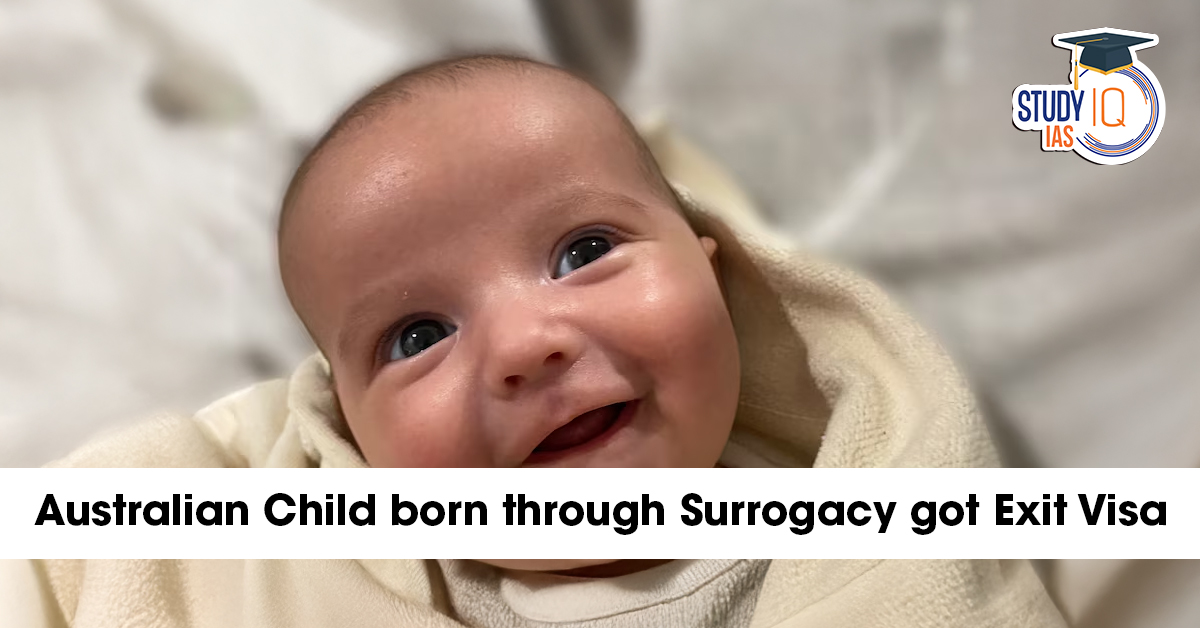Table of Contents
Context: An Exit visa was granted to a 6-year-old Australian child born through surrogacy in India in 2019, finally granted by intervention of the Delhi High Court and coordination between the Ministry of Health & Family Welfare (MoHFW) and the Ministry of Home Affairs (MHA).
More in News
- The exit visa was delayed due to confusion over whether the surrogacy was legal for foreigners under new laws.
- The court emphasised that laws in force at the time of birth (2019) should apply, not those enacted later (2022).
What is an Exit Visa?
- An exit visa is a formal permission granted to a foreigner residing in a country without a valid visa to leave that country.
- It is issued in exceptional situations, such as:
- Overstayed without valid immigration documents.
- Foreign nationals (including OCI cardholders) who do not have valid entry stamps or legal entry documentation.
| Types of Surrogacy |
Altruistic Surrogacy (✅ Allowed in India): The surrogate mother does not receive any monetary compensation, except for medical expenses and insurance coverage.
Commercial Surrogacy (❌ Banned in India): The surrogate mother is financially compensated beyond medical expenses.
|
Surrogacy (Regulation) Act, 2021 – Key Provisions
Surrogacy is when a woman carries and gives birth to a child for an intending couple, and hands over the child post-birth.
Regulation:
- Commercial surrogacy is banned.
- Altruistic surrogacy is permitted under specific medical necessity.
- Surrogacy is not allowed for purposes like sale, prostitution, or exploitation.
- Only allowed for medical indications and diseases specified in regulations.
Eligibility Criteria:
- For Surrogate Mother:
- Must be a willing, married woman, aged 25–35 years.
- Must have at least one biological child of her own.
- Cannot act as a surrogate more than once in her lifetime.
- Needs a certificate of medical and psychological fitness.
- For Intending Couple: Must obtain:
- A Certificate of Essentiality (medical justification).
- A Certificate of Eligibility (age, marital status, childlessness).
- Indian widow or divorcee woman (35–45 years) is also allowed surrogacy if other conditions are met.
- Rights of the Surrogate Child:
- Treated as the biological child of the intending couple.
- Entitled to all rights and privileges available to a natural-born child.
- Prohibition of Abortion: A Surrogate mother cannot be forced to abort except under conditions specified by law.
Institutional Framework
- National Assisted Reproductive Technology & Surrogacy Board (headed by Union Health Minister):
- Advises on policy.
- Monitors implementation.
- Sets standards for clinics.
- Regulates infrastructure and manpower.
- State ART and Surrogacy Boards:
- Established in each State/UT with legislature.
- Responsible for local oversight and regulation.
Surrogacy (Regulation) Rules, 2022
- In March 2023, an amendment prohibited the use of donor gametes, mandating both gametes (sperm and egg) to come from the intending couple.
- In October 2023, the Supreme Court in Arun Muthuvel vs. Union of India allowed surrogacy using a donor egg for a woman with Mayer-Rokitansky-Kuster-Hauser (MRKH) Syndrome, stating the restriction was prima facie contrary to the objective of the Act.
2024 Amendment to Surrogacy Rules
- The 2024 amendment allowed use of donor gametes in surrogacy under medical necessity.
- The benefit is permitted only when the District Medical Board certifies that either partner suffers from a medical condition requiring use of a donor gamete.


 Graphic Processing Units (GPUs) – Work...
Graphic Processing Units (GPUs) – Work...
 Gold Imports and the Indian Economy – ...
Gold Imports and the Indian Economy – ...
 Nilgiri Tahr Conservation: Ecology, Habi...
Nilgiri Tahr Conservation: Ecology, Habi...




















